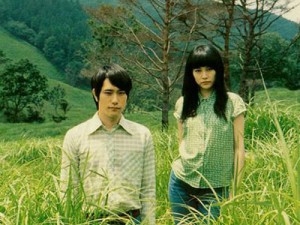film review: norwegian wood
The 2011 film adaptation of Haruki Murakami’s 1987 bestselling novel Norwegian Wood is set in 1960s Tokyo and follows the quiet university student Toru Watanabe (Kenichi Matsuyama) as he struggles to deal with his best friend Kizuki’s (Kengo Kora) suicide. Apart from an unlikely friendship with suave playboy Nagasawa (Tetsuji Tamayama), Watanabe keeps to himself, finding distractions in books. A surprise encounter with Kizuki’s former girlfriend, the beautiful, enigmatic Naoko (Rinko Kikuchi), leads to an intense bond between them as they connect over the loss of the young man to whom they were once so close.
However, after sleeping with Watanabe, Naoko has an emotional breakdown and commits herself into a remote facility for the mentally unstable, where she is cared for by her roommate Reiko (Reika Kirishima). Despite Watanabe’s feelings of helplessness he continues to be devoted to her, but things become more complicated when he meets confident, outspoken Midori (Kiko Mizuhara) – Naoko’s complete opposite in character – who expresses interest in him and manages to break through his barrier of aloofness. Watanabe becomes caught between the two women; one who is engulfed by grief and another who hides hers behind a light-hearted facade.
Vietnamese director Tran Anh Hung’s efforts in translating Murakami’s cherished novel into a cinematic piece is valiant, but ultimately the film seems like a mere summary in comparison; a prime example of this is the exclusion of the story behind why Reiko was in the mental asylum, which causes what could have been a tender scene between Reiko and Watanabe to fall flat as the viewer is not given that extra context. The contrasting visuals of a bustling, urban Tokyo against a secluded facility in forested mountains are striking, and indeed the entire film is beautifully and artistically shot. However, the gratuitous scenes that go on for minutes too long (including sequences showing student riots in Tokyo that didn’t contribute in any way to the story); and other scenes that could have been elaborated, are cut short prematurely – all detract from the experience.
Having said this, the film should not simply be dismissed as shallow. Strong performances ensure that the characters remain believable; with Matsuyama as the restrained, torn Watanabe, Mizuhara as the odd but charming Midori and Kikuchi excelling in her role as the tortured Naoko trapped by the past, the relationship and emotional development between the three are accurate portrayals of their literary counterparts. Stunning cinematography courtesy of Mark Lee Ping Bin and an affecting score provided by Radiohead’s Jonny Greenwood and German band Can, also help to redeem an otherwise languorous script that often fails to deliver the deeper meaning behind the actions of Murakami’s characters.



Pingback: Norwegian Wood |